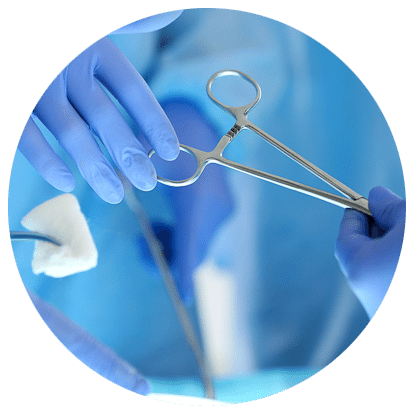Fertility Surgery Treatment Options
We can classify fertility issues into several categories, each of which call for a different treatment approach. A number of these can be resolved or improved through reproductive surgery.
Physiological Aspects of Infertility
Blocked Fallopian Tubes
First, there may be reproductive physiology problems that prevent the sperm from reaching the egg or vice versa. These include blocked fallopian tubes due to prior disease, infection or injury. This can result from sexually transmitted diseases or other infection, scar tissue, pelvic adhesions, or congenital physical abnormalities. Sometimes the tubes can be filled with fluid (called a hydrosalpinx), which not only prevents natural conception, but can also greatly reduce the success rates of IVF, even though the procedure bypasses the fallopian tubes. For this reason, we recommend surgical treatment or removal of the affected tube prior to undergoing in vitro fertilization.
Dr. Caperton and the team at Caperton Fertility will discuss your particular condition and circumstances with you and give you their honest opinion and best recommendation as to what procedure will provide the best chances for achieving a viable pregnancy. At Caperton Fertility Institute, we have extensive experience performing surgical procedures to address blocked and obstructed fallopian tubes as well as hydrosalpinges.
Tied Fallopian Tubes
In some cases, a woman may have undergone a tubal ligation (had had her tubes “tied”) to prevent pregnancy in consideration of her current circumstances, then decide at a later point as her circumstances change that she would like to get pregnant. There is a surgical procedure that may be performed that is intended to restore the fallopian tubes to functional condition. This procedure is known as a “tubal reanastomosis” – more commonly called a “tubal ligation reversal.”
At Caperton Fertility Institute, we believe that woman who have undergone a tubal ligation procedure may be candidates for reversal surgery or for In Vitro Fertilization. Although reversal surgery can be very effective in a limited number of circumstances, the procedure has not dramatically improved in many decades, and In Vitro Fertilization continues to improve annually with breakthroughs in technology. Because IVF has become more successful, and safer with the advent and application of Single Embryo Transfer, women in our practice often elect to forego the risks of tubal reversal surgery and pursue IVF.
Endometriosis and Pelvic Adhesions
Another physiological cause of fertility problems is the presence of endometriosis, cysts, fibroids, polyps and pelvic adhesions. Endometriosis, in simple terms, is the growth of endometrial (uterine) tissue outside of the uterus. It can cause adhesions – where this tissue adheres to other tissues or organs in the pelvic cavity and causes adverse reactions and an environment that is not conducive to a successful pregnancy. Another effect of endometriosis can be the occurrence of cysts on the ovaries. Ovarian cysts, often called ovarian endometriomas, can interfere with ovarian function and fertility. Another cause of pelvic adhesions is scar tissue resulting from pelvic surgery. This scar tissue can cause internal organs to adhere to each other and interfere with the function of the ovaries, fallopian tubes, and uterus – often preventing sperm from finding the eggs or embryos from being transported to the uterus and undergoing normal implantation. Cysts, polyps and fibroids can also occur in the uterus and can affect uterine function and also hinder the ability of the embryo to implant in the uterus. For this reason, we recommend having them removed before trying to conceive or undergoing intrauterine insemination (IUI) or in vitro fertilization (IVF).
At Caperton Fertility, we are experienced at surgically treating adhesions and endometriosis in the pelvic cavity to restore fertility. We offer minimally invasive surgical procedures for removing cysts, polyps and pelvic adhesions. Almost all of these procedures are now completed within the comfort of our modern 6000 sq ft location in Albuquerque, or in Texas.
Reproductive Surgery Specialists
Both Dr. Lee and Dr. Kelly Caperton have extensive experience and expertise in gynecologic and reproductive / fertility surgery. Moreover, they have among the lowest complication rates for surgical procedures in the area, and likely in the nation. Drs. Caperton and Caperton have performed thousands of in-office and operating room procedures in their mission to help individuals and couples struggling with infertility. We can perform the following types of surgery to address fertility and conception issues:
- Treatment and/or removal of endometriosis, adhesions or scar tissue from around the fallopian tubes, ovaries or uterus
- Operating on blocked fallopian tubes
- Removal of ovarian cysts
- Endometriosis treatment
- Uterine fibroid removal
- Repair of uterine scarring
- Repair of uterine anomalies (septums)
- Removal of intrauterine fibroids
- Removal of intrauterine polyps
Most of these fertility surgery procedures are performed in our state-of-art facility as outpatient surgery, meanwhile minimizing the mental, physical and emotional stress associated with similar procedures at area hospitals or surgical centers.


